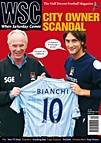 Dunga played for two of Brazil’s dullest coaches and is now following in their footsteps – but none the less his team conquered the opposition to win another Copa América. Rodrigo Orihuela reports
Dunga played for two of Brazil’s dullest coaches and is now following in their footsteps – but none the less his team conquered the opposition to win another Copa América. Rodrigo Orihuela reports
Were it not for Sebastião Lazaroni, Carlos Alberto Parreira would surely be remembered as Brazil’s most defensive coach ever. Parreira’s 1994 World Cup-winning side were the antithesis of stereotypical Brazilian jogo bonito, but managed to lift a major trophy.
Lazaroni, on the other hand, failed categorically in the 1990 World Cup: Brazil were knocked out in the second round by Argentina. Granted, he did coach the 1989 Copa América winners, but he will always be remembered as the coach who tried to introduce the libero position into the national side. After being sacked, Lazaroni moved to a place more suited to his defensive obsessions: Italy, where he coached Fiorentina and was reunited with the young Brazilian midfielder Carlos Caetano Bledorn Verri, better known as Dunga, who played in the 1990 and 1994 World Cups, as well as in 1998.
With last month’s victory over Argentina in the Copa América in Venezuela, Dunga has shown that his time under Lazaroni and Parreira was well spent. He learnt their script and is applying it to the letter. Brazilians typically consider Argentina to be over-acters and cheaters who never stop whining. But in the final in Maracaibo, on July 15, it was Brazil rather than their opponents constantly fouling and eager to break up play as a quickly as possible. Dunga realised that if Argentina relied on the slow-paced, smooth passing of Juan Román Riquelme and Juan Sebastián Verón and had only Lionel Messi as an option to accelerate attacks, then the best approach was to outrun Argentina and stop them from passing. If that meant fouling and waiting for the counter-attack, then so be it.
In hindsight, what makes Brazil’s win seem even more bizarre is the realisation that their success was based on defence in a tournament that was highly entertaining overall with matches that gave crowds their money’s worth. And the fans deserved the spectacle because, in the only South American country where football is not the most popular sport, they created an impressive atmosphere at the stadiums – all of which had been newly built or refurbished for the occasion. Venezuela, beaten 4-1 by Uruguay in the last eight, may have not pulled the surprise organisers were hoping for, but the locals didn’t seem to care much and enthusiastically supported the other teams.
Goals were scored in staggering amounts: all four quarter-final games had four goals or more, both semi-final matches had three or more and there were only two goalless matches in the entire tournament (both in final group matches). Even flair-free Brazil did quite well when it came to attacking, scoring 15 times in six matches and winning the final 3-0.
While the championship may hail the start of an era of ugly play for Brazil as memorable as Parreira’s, and maybe even Lazaroni’s, it was also the last nail in the coffin of a famously overrated generation of Argentines. Javier Zanetti, Roberto Ayala, Hernán Crespo and Verón were the remains of a generation born around the mid-Seventies who won the silver medal in the 1996 Olympics but have failed to land a major senior title.
Both for Argentina and their rivals, Ayala will be the player most missed from this group. It will be a long time before another right-footed centre-back of such calibre appears. However, for all his fierce tackling and impressive heading, Argentina supporters think Ayala’s departure may herald better times for their defence given his record of fatal blunders.
The own goal against Brazil in the final was not a one-off: in 1998, Ayala was meant to be marking Dennis Bergkamp in the World Cup quarter-final when, with the match tied at 1-1 and under five minutes left, the Dutchman received a 50-yard pass in the area and scored the winner that sent Argentina home; in the 2006 World Cup, Ayala was the first Argentine to miss a penalty in the quarter-final shootout against Germany, that, once again, sent Argentina home; and in the 2004 Copa América final against Brazil, Ayala lost Luisão for Brazil’s first equaliser and Adriano for the second – scored in added time – as Argentina were held 2-2 and lost on penalties.
Without Ayala, Argentina may well be short of a top-class centre-back for the first time in decades. Meanwhile, Brazil will be going against tradition with a team more concerned with protecting their own goal than attacking their rivals’. Strange times may lie ahead in the world of football.
From WSC 247 September 2007